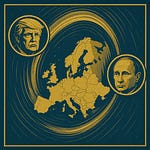March 2025 may go down as a pivotal moment in European defense policy. At the latest EU Summit, leaders backed a bold new plan to boost Europe's military strength—with serious funding behind it. But what’s actually in the White Paper on Defense? And what does the Rearm Europe plan mean for the EU's future?
Let’s break it down.
The End of the Peace Dividend ☮️➡️⚔️
“The era of the peace dividend is over.”
— Ursula von der Leyen, European Commission President
Russia’s invasion of Ukraine is still front and center. But beyond that, the EU sees a world entering a new era of instability and hard power. The White Paper warns:
Russia may spend more on defense in 2025 (adjusted for purchasing power) than all EU countries combined.
China’s military rise is reshaping global dynamics.
Hybrid threats—like cyberattacks, disinformation, and satellite sabotage—are on the rise.
In short: Europe is waking up to a world that’s becoming more dangerous—and more complex.
The 7 Priorities of the White Paper 📜
The EU's goal? Full defense readiness by 2030.
Here are the seven critical capabilities the White Paper focuses on:
Air & missile defense systems
Long-range precision artillery
Stockpiles of ammunition & production ramp-up
Drone tech & counter-drone capabilities
Fast troop mobility across the EU
Advanced tech: AI, cyber, quantum, electronic warfare
Resilient infrastructure (e.g. Eastern Border Shield)
This isn't just military rearmament—it’s a blueprint for European strategic autonomy.
Funding It All: Rearm Europe & the SAFE Regulation 💶
Here’s where it gets serious:
The SAFE Regulation proposes €150 billion in loans to member states for defense investments.
How it works:
Step 1: Countries request loan support
Step 2: Commission assigns tentative amounts
Step 3: Within 6 months, detailed investment plans must be submitted—focused on those 7 priority areas
But there's a catch:
All projects must involve joint procurement between countries, and defense contractors must be EU-based (or from EFTA states or Ukraine).
It’s designed to build a European defense market—and reduce reliance on outside suppliers.
Ukraine’s Role: Integration, Not Just Support 🇺🇦
Ukraine isn't just receiving help—it’s becoming a strategic partner.
The White Paper highlights:
Ukraine’s battlefield-tested innovations (especially in drones and AI)
A plan to integrate Ukraine’s defense sector into the EU ecosystem
The proposed Ukraine Support Instrument as a key facilitator
It’s a pragmatic move to bring in experience, scale, and flexibility.
More Than Just Military: Economic Impact 📈
The rearmament strategy is also about stimulating Europe’s tech and industrial base.
New jobs across defense and tech industries
Boost to innovation in AI, quantum computing, cybersecurity
€2 billion/year in defense investment from the European Investment Bank
Use of the Stability Pact escape clause to allow more national spending
This could be a strategic and economic win—if executed well.
What’s at Stake? ⚖️
This plan signals a shift:
From dependence to self-reliance
From fragmented national systems to collaborative procurement
From peace-time assumptions to strategic realism
But as always, the big question is:
Can they follow through? Will all 27 member states stay aligned and committed?
If they do, Europe could emerge stronger, safer, and more sovereign than it has in decades.
Further Reading & Resources 📚
Want more?
Follow The Europragmatist on Spotify, Instagram, and right here on Substack for regular deep dives on what’s happening inside the EU.












